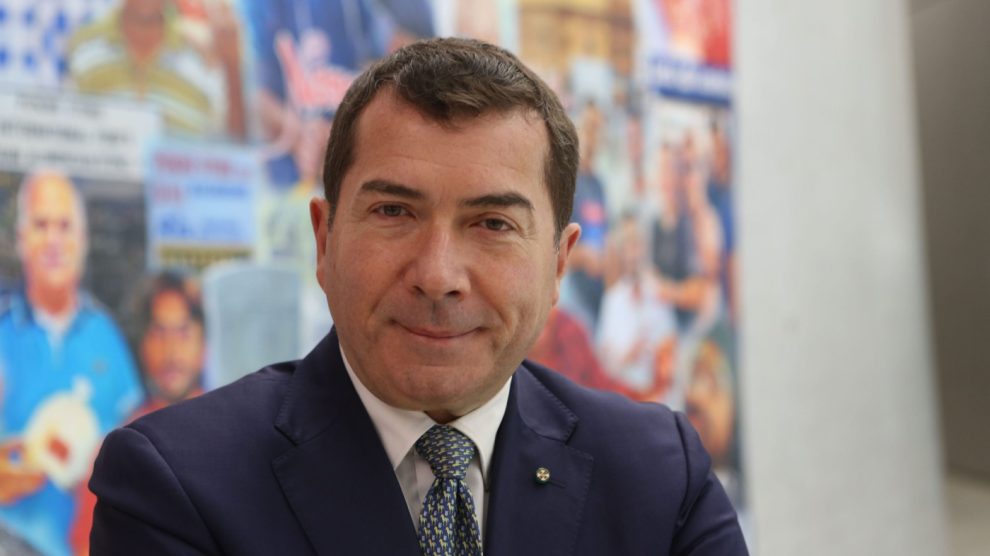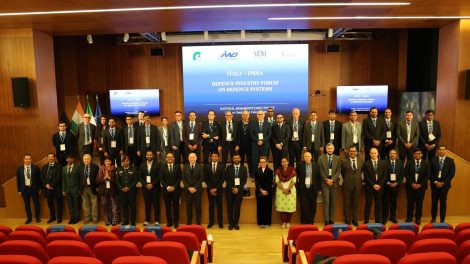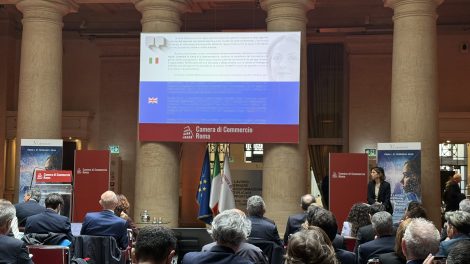The following are excerpts from our sister website’s interview with Enrico Savio. Find the fully-translated interview below.
The recent agreements “are part of a strategy to strengthen Leonardo in the world as a global player, including through the lever of innovation, and thus the creation of structural relationships with the most advanced innovation ecosystems,” such as Israel.
- The Italian titan signed an agreement with the Israeli Innovation Authority, i.e. the authority delegated by the Israeli government to promote innovation, “to strengthen and broaden the field of collaboration […] to other fields of innovation, including scouting startups.”
- It also signed with Ramot, the technology transfer office of Tel Aviv University, which acts as “another gateway to Israeli innovation with 30,000 students, 16,000 researchers, 1,600 patents, and a world-class fabric of startup founders.”
On Leonardo’s strategic approach. The company’s international growth plan is “geared at long-term structural presence using all the levers available to the group, including innovation, mergers and acquisitions (M&A), strategic partnerships, as well as the weight of diplomatic, institutional and governmental relations between Italy and the chosen country.”
- Given such an approach must be selective, Leonardo has “defined a shortlist of strategic countries in which to invest, including Israel, in addition to the domestic countries for the group, such as Italy, the United States, the United Kingdom and Poland.”
- The acquisition of RADA Electronic Industries “is part of this strategic localisation framework.”
Attention startups. “Simulation & Gamification, Cybersecurity & Networking are the verticals of the Call for Startups that we launched in January 2023 to select ten teams that will enter the 2023 acceleration programme of the Business Innovation Factory.”
In early February, Leonardo strengthened relations with Israel over innovation, a sector where Tel Aviv can boast a unique ecosystem made up of over 7,000 startups, hundreds of accelerators and dozens of active incubators. The Italian defence and aerospace group signed two agreements, part of a broader strategy to strengthen the company worldwide, as described to Airpress by Enrico Savio, Leonardo’s Chief Strategy and Market Intelligence Officer.
Mr Savio, what are the scope and objectives of these agreements?
They are part of a strategy to strengthen Leonardo in the world as a global player, including through the lever of innovation and the creation of structural relationships with the most advanced innovation ecosystems. The Israeli Innovation Authority (IIA) is the authority delegated by the Israeli government to promote innovation, and through the agreement signed on February 1, we wanted to strengthen and broaden the field of collaboration (provided for in the 2014 agreement) to other fields of innovation, including startups scouting.
Moreover, to make the agreement immediately operational, we are already working with IIA to scout startups for Leonardo’s acceleration programme, the Business Innovation Factory. This year it focuses on the verticals of Simulation & Gamification and Cybersecurity & Networking, areas of excellence of Israeli startups.
The agreement with Ramot, which is the technology transfer office of Tel Aviv University, focuses on research projects on topics of interest to Leonardo, such as cyber, quantum, advanced materials, and autonomous driving systems. We could consider opening a Leonardo Lab in Israel if the collaboration is fruitful. For Leonardo, Ramot is another gateway to Israeli innovation with 30,000 students, 16,000 researchers, 1,600 patents, and a world-class fabric of startup founders. In fact, it ranks sixth in the world for the number of students founding a startup and seventh for students founding a startup with valuations over fifty million dollars.
The partnerships seem to fit in with the Leonardo DRS-RADA operation. In this sense, what is Israel’s role in the group’s international growth strategy?
To develop and strengthen Leonardo in the world, we have moved from an opportunistic approach, driven by commercial opportunities alone, to a strategic approach geared at long-term structural presence using all the levers available to the group, including innovation, mergers and acquisitions (M&A), strategic partnerships, as well as the weight of diplomatic, institutional and governmental relations between Italy and the chosen country.
Clearly, the strategic approach requires significant investments of time and resources, and by its very nature, it must be selective. In fact, following a rigorous analysis, we have defined a shortlist of strategic countries in which to invest, including Israel, in addition to the domestic countries for the group, such as Italy, the United States, the United Kingdom and Poland.
The acquisition of RADA Electronic Industries is part of this strategic localisation framework for Leonardo. Thus, the company can now count on about three hundred local resources and the contribution of cutting-edge products and technologies, as well as the opportunity to use RADA’s vehicle – already listed on Nasdaq and the Tel Aviv stock exchange – to list DRS, an operation that we had suspended due to lack of suitable conditions.
Added to this is the lever of innovation, and therefore Leonardo’s desire to build structural relationships with innovation ecosystems in countries capable of contributing to the Be Tomorrow 2030 strategic plan, which aims to strengthen the group’s competitive positioning by also using open innovation. We had no doubts about engaging Israel’s innovation ecosystem, which has become a virtuous model and driver of the country’s growth, contributing to 15% of GDP, making up 50.4% of exports, and employing around 10.4% of the workforce out of a population of nine and a half million. Moreover, as a startup nation, it consists of over seven thousand startups, 428 venture capital funds, more than one hundred accelerators, 37 incubators, almost five hundred research and development centres of multinationals, 17 technology transfer programmes, and nine public universities.
Collaborations are mainly concentrated in the strategic sectors of defence, cyber security and aerospace. What spin-offs are expected in terms of technology?
On the one hand, the collaborations with Israel will take into account Leonardo’s need to tap into open innovation. Leonardo invests 12 to 23% of its turnover in research and development every year (12.8% in 2021, for a value of €1.8 billion). On the other hand, the agreements will also allow Leonardo to leverage the country’s specificities and excellences within an overall framework that includes both domestic and other strategic countries.
The mentioned themes of Simulation & Gamification, Cybersecurity & Networking are the verticals of the Call for Startups that we launched in January 2023 to select ten teams that will enter the 2023 acceleration programme of the Business Innovation Factory. This year, to promote the call, we will do a five-stage road show starting in Naples, continuing with Milan, Munich, Tel Aviv and ending in London, all cities in domestic or strategic countries. Membership is free, and those interested in participating in the road shows or applying to BIF23 may refer to the Leonardo Accelerator website.
Italian and Israeli diplomacies contributed to the partnership. Is this an example of the public-private synergy that should become systemic in the future?
The support of the institutions, government, ministries, and diplomacy is fundamental for Leonardo’s strategic development in the world. We move in complex geopolitical contexts where competition is fierce between companies as well as country-systems. Just think of how France, the United Kingdom and the United States move on the international chessboard. We must all be co-interested in fostering the growth of large national companies like Leonardo because this means contributing to Italy’s economic, employment and skills growth by improving the competitiveness and sustainability of the country-system as a whole.
In the wake of the agreements, what are the next steps?
With the Israeli Innovation Authority, as mentioned, we are already working to find startups of interest for the BIF23 acceleration programme, which will start in May, last six months, and include the creation of a Proof of Concept. We hope to have at least one Israeli startup at the starting line in May. In addition, as anticipated, the BIF23 roadshow will take place on February 28 in Tel Aviv; we want to introduce the Leonardo group to innovation operators in Israel, present the acceleration programme and attract startups of interest.





